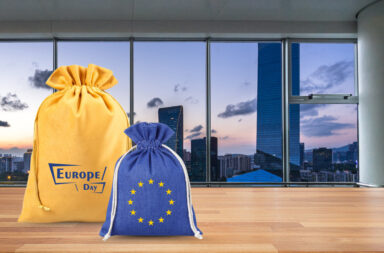Have you ever wondered how, with just a few simple tricks that aren’t difficult at all, you can build brand awareness?
Contemporary marketing constantly seeks new ways to reach consumers’ awareness while also emphasizing ecology and sustainable development. In this context, improving brand image becomes extremely important, achievable through intelligent and thoughtful promotional activities. Fabric bags, due to their versatility and environmental friendliness, serve as an excellent example of such a strategy.
Brand awareness building
Our fabric bags, made of organza, satin, linen, jute, etc., are not only an ecological choice for conscious consumers but also a powerful marketing tool that can significantly improve brand image. Through them, companies have the opportunity not only to demonstrate their commitment to environmental protection but also to effectively increase their visibility in the market.
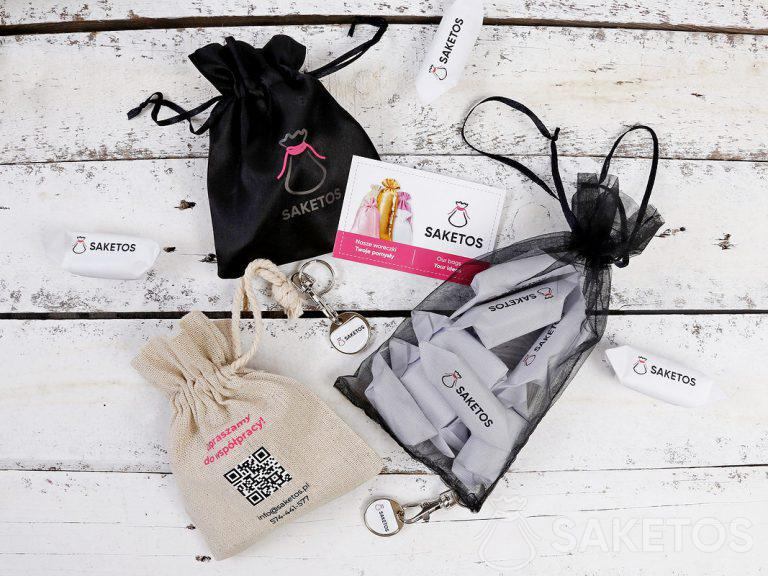
Fabric bags with company logo
One of the brands collaborating with us – let’s call it Brand A – taking advantage of trade shows, decided to use 100% cotton bags as part of its marketing strategy. Personalising eco-friendly gadgets with the company’s logo and slogan allowed Brand A to emphasise its commitment to sustainable development and establish direct contact with potential customers and business partners.
This demonstrates that modern marketing can utilise eco-friendly tools to enhance brand image and consumer awareness. Fabric bags, being used daily, become lively advertising carriers that not only attract attention but also convey brand values. Through them, every customer, using such a bag, unknowingly supports building brand awareness and spreads its image.
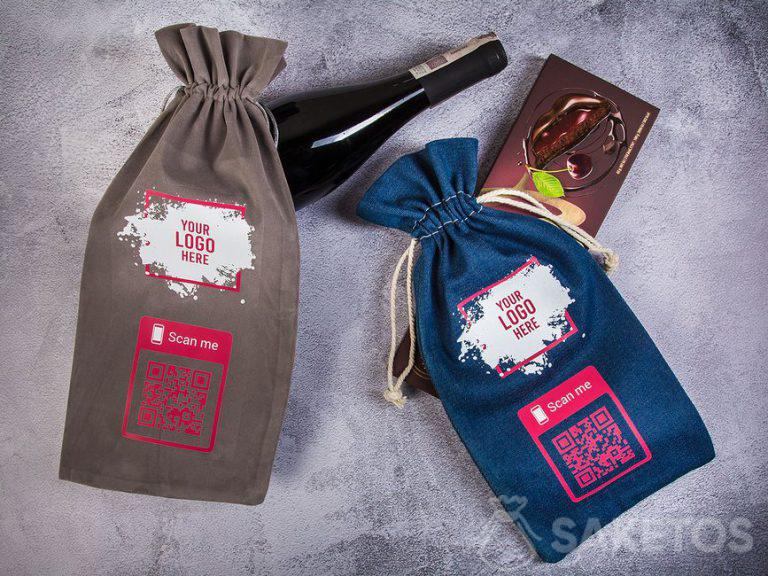
Personalisation of advertising packaging
In the digital era, where consumers are inundated with information, it’s crucial to stand out and remain memorable. Fabric bags offer a unique opportunity to build a lasting, positive brand identity. It’s not only an expression of a company’s sustainable approach but also a strategy that can bring measurable benefits in customer recognition and loyalty.
By using fabric bags as a marketing tool, brands can significantly strengthen their position in the market while simultaneously building a positive image in the eyes of consumers. This demonstrates how important it is in modern marketing to combine business goals with social and environmental responsibility, which not only improves brand image but also contributes to building a better world.
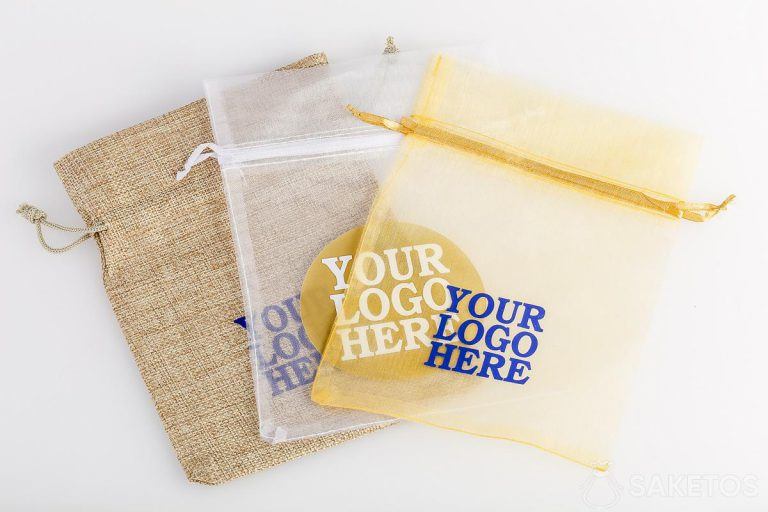
Fabric bags with company logo
Visibility, or stand out from the competition
In a world where market competition is intense and customers have countless options to choose from, brand visibility becomes a crucial element of every company’s strategy. In this context, fabric bags offer a unique opportunity for differentiation through individualisation and personalisation. One of our retail clients – let’s call them Retailer B – utilising this strategy, decided to introduce bags with a distinctive, easily recognisable pattern that reflected the values and aesthetics of their own brand. This simple yet highly effective method allowed for the establishment of a strong visual identity, making customers, by using these bags in their daily lives, living advertisements for the company. Therefore, the personalisation of bags tailored with prints “to the customer’s liking” is the key here.
However, it’s not just the pattern or logo on the material that determines the effectiveness of this strategy. The colour scheme, quality of the material, and even the way the bag is stitched can contribute to building a positive brand image. Contemporary marketing demands from companies not only creativity but also an understanding of how important every interaction with the customer is. Fabric bags, with their practicality and aesthetics, can become a tool that not only enhances brand recognition but also builds an emotional connection with customers.
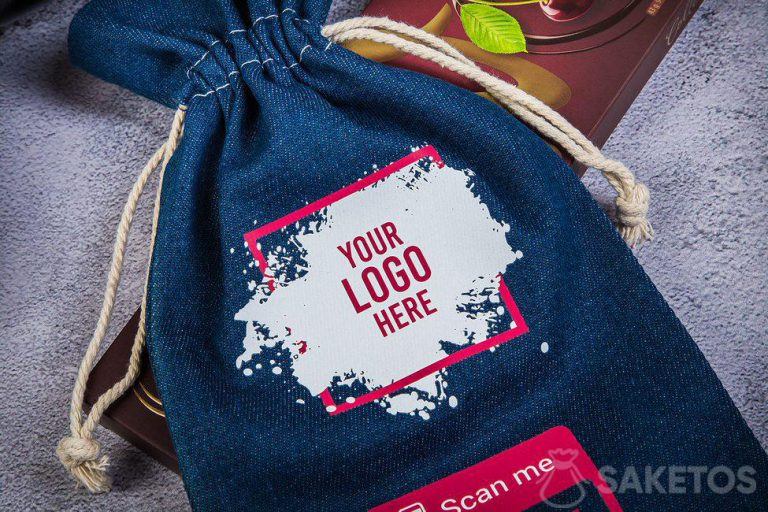
Use good quality packaging as an additional advertising medium!
Retailer B is experimenting with limited edition fabric bags, which increases customer interest. This strategy creates a sense of exclusivity around the brand and strengthens its visibility. Customers who acquire these editions often share them on social media, translating into free promotion and expanding the brand’s reach.
Personalising fabric bags not only enhances brand recognition but also grabs the attention of potential customers. It reinforces a positive company image and builds strong, emotional relationships with customers. In the era of modern marketing, authenticity and uniqueness are crucial. Fabric bags can be the key to success.
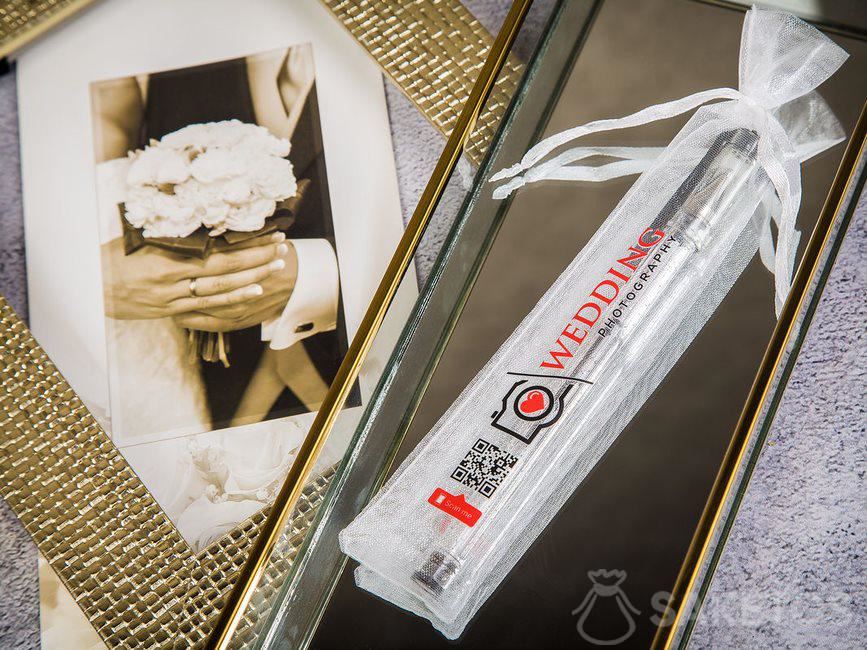
Pen in pouch with logo and QR code
Improving brand image through corporate social responsibility
Now, in the 21st century, amidst the era of global ecological awareness and the growing importance of sustainable development, contemporary marketing strategies must go beyond traditional approaches. Corporate Social Responsibility (CSR) has become not only a reputation-building element but also a key decision-making factor for many consumers. In this context, the use of fabric bags expresses a strong commitment of the brand to environmental protection, which can significantly influence its perception, perfectly fitting into brand awareness building.
An example of such action is the initiative of brand C, which committed to planting a tree for every 100 fabric bags sold. This business model combines the practical benefits of the product with a direct positive impact on the environment. These efforts not only contribute to reforestation and increasing biodiversity but also promote the brand as a leader in sustainable development. The result is not only the solidification of a positive image among current customers but also the attraction of new ones who value ecological initiatives.
Additionally, such a business approach provides brands with the opportunity to tell inspiring stories, which can be amplified through social media and traditional communication channels. Stories about how each purchased fabric bag contributes to tree planting can strengthen positive associations with the brand and build deeper, emotional relationships with consumers.

Packaging for promotional items
By engaging in such actions, Brand C not only contributes to a better future for our planet but also sets an example for other businesses, showing that social and environmental responsibility can go hand in hand with business success. These initiatives demonstrate how brands can positively impact the world while building a strong and positive image in the eyes of both current and future customers.
In summary, improving brand image in today’s times requires more than just traditional advertising methods. Engaging in ecological and socially responsible initiatives, such as introducing fabric bags and direct actions for environmental protection, can bring long-term benefits for the brand, strengthening its reputation and customer loyalty. In this context, Brand C becomes an inspiring example of how modern marketing and CSR can create valuable synergy, benefiting both the company and the entire planet.
Social Engagement
Currently, in the present time, where consumers are increasingly aware and expect more from brands than just products and services, social engagement becomes an integral element of building a strong and positive brand. Company D, understanding this shift in consumer perception and values, has decided to actively engage in addressing local social issues by allocating a portion of the profits from the sale of its products packaged in fabric bags to support local charitable initiatives.
Such actions not only contribute to improving living conditions in communities that need it most but also shape the brand as a responsible and engaged participant in social life. Customers, when choosing products from company D, not only receive high-quality, eco-friendly bags but also become part of a larger change, contributing to the greater good. This sense of belonging and impact on positive changes is invaluable and builds deep loyalty towards the brand.

Organza bag with company logo
Modern marketing goes far beyond traditional advertising or promotion. By engaging in socially important issues and demonstrating genuine commitment to improving quality of life, companies can build lasting, emotional relationships with consumers. Social engagement, such as the initiative of company D, becomes a powerful marketing tool that sets the brand apart from the competition, attracting customers who share similar values and aspirations.
These actions generate significant activity on social media, where customers eagerly share their engagement. The brand becomes not only a seller but also a leader of social change. This inspires customers and other companies to take similar actions. Company D’s social engagement transforms into a powerful brand narrative, building a strong and positive image.
As a result, social engagement, manifested through support for local charitable initiatives by donating a percentage of profits from each sold fabric bag, not only brings direct social benefits but also plays a crucial role in Company D’s marketing strategy. It demonstrates that in today’s times, a brand’s success is measured not only by financial results but also by its impact on society and the environment. This approach, where contemporary marketing harmoniously aligns with genuine commitment to important social issues, opens new perspectives for brand building in the 21st century.
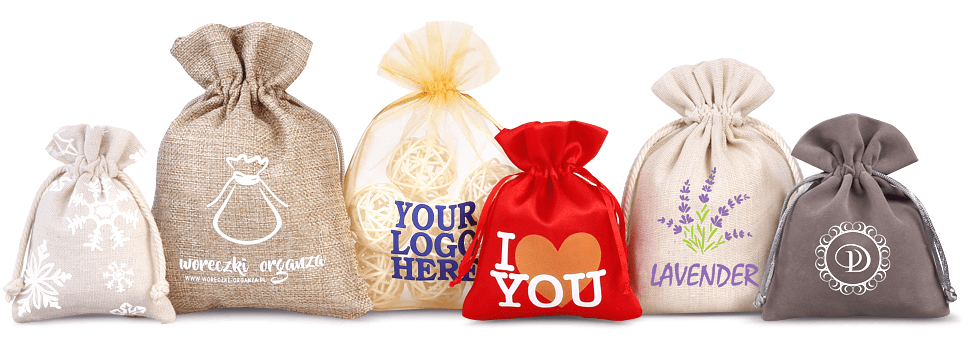
Personalised cloth bags for your company
Let’s summarise our thoughts and the case studies we’ve outlined
The products of the Saketos brand, whether for retailers, wholesalers, or manufacturers, such as fabric bags, offer wide-ranging opportunities for companies seeking not only to improve their image but also to actively participate in promoting sustainable development. They serve as an excellent example of how modern marketing can be effective, environmentally friendly, and socially responsible. Investing in such promotional tools is not just a step towards ecology but also a significant action towards building lasting and positive relationships with customers, which in the long run translates into the success of the brand.


